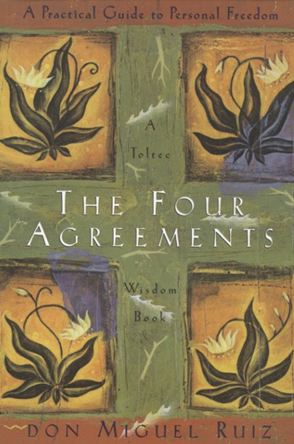 Universal wisdom should apply universally, thus good advice should (most of the time) apply to good writing.
Universal wisdom should apply universally, thus good advice should (most of the time) apply to good writing.
I stumbled upon this idea in a previous post as I considered the importance of keeping my word when I say I will do something. Not only does the phrase “keeping my word” include “word” in its phrase and thus hint toward the occupation of weaving and crafting words, but it underlines the importance of integrity to oneself and others as a personal and writer-ly goal.
In Don Miguel Ruiz’s book, The Four Agreements, he discusses the importance of four concepts that enhance and strengthen one’s life. Half the reason that these agreements are powerful is that they are so easy to remember once you learn them.
I will take a short paraphrase of the four agreements in this book and use them in the context of writing.
THE FOUR AGREEMENTS
 1. Be impeccable with your word – Speak your word with integrity. Say things clearly, and say what you mean to say. Do not make promises that you don’t intend to keep, do not use this your word against yourself or others. Use your word for truth and love.
1. Be impeccable with your word – Speak your word with integrity. Say things clearly, and say what you mean to say. Do not make promises that you don’t intend to keep, do not use this your word against yourself or others. Use your word for truth and love.
If it’s true in life, doesn’t this make it true in writing? This means that your writing should have a purpose and message. It should offer your readers a clear means of understanding what you want to say and this message should be one designed to equip them, to make them better, stronger, more compassionate, etc. It should be used for the good.
On a less serious note, if you’ve made a committment to yourself to write, you should uphold this. The word grows stronger the more it is kept.
 2. Don’t take anything personally – People behave the way they do 99.9% of the time because of themselves. Their behavior is not because of you. If you can shrug away the opinions and harsh judgments of others, you will be able to avoid becoming a needless victim.
2. Don’t take anything personally – People behave the way they do 99.9% of the time because of themselves. Their behavior is not because of you. If you can shrug away the opinions and harsh judgments of others, you will be able to avoid becoming a needless victim.
This is especially helpful in light of your writing’s rejection. Your friends and family might (or might not) read and enjoy your work, but then there is the much larger pool of critics and editors and agents who read your stories and respond with “Thanks, but this isn’t for us.”
You cannot assume this is only because your writing is bad (I have to tell myself this, all the time). A humble, teachable writer will always look for ways to improve, but rejection is natural.
In life, people will reject my advice, my friendship, my help–you name it. My writing is bound to be rejected, too, and it’s my responsibility to not let that rejection form the assumption that I or my writing are not good enough. It’s not a fair assumption. Which leads me to the next agreement.
 3. Don’t make assumptions – Clarify things that are ambiguous, step forward and ask the tender questions. Make sure that when you speak, there is no room for another interpretation. This agreement has deep impact on communications and relationships.
3. Don’t make assumptions – Clarify things that are ambiguous, step forward and ask the tender questions. Make sure that when you speak, there is no room for another interpretation. This agreement has deep impact on communications and relationships.
Let’s begin with the example of a vague critic. Someone reads your story manuscript and says it’s not “unique enough.” They may have something in mind, but they’re not getting at the meat of what they think is wrong. Ask clarifying questions as much as you can. Don’t assume that a blanket statement means exactly what you think it means. Don’t assume a rejection or acceptance has to do with what you think it does. Listen and ask questions when you think you might have leapt ahead in your logic.
This will always give you grounded answers that you can work with. In the critic example, if your critic gives you more specifics, you have suggestions or trouble spots you can actually work on within your story.
If the critic can’t give you anything more specific, it’s possible that their feedback wasn’t helpful to begin with, it was just vaguely insulting, which means you don’t have to worry about it
 4. Always do your best – This does not mean 100% of your effort 24/7 or even that insane level of output and productivity for five days a week. Your best depends on your health, your emotions, and your physical limits, prior to pushing them beyond the point of no return. Your best means giving every project the attention and dedication it deserves without cheating it or faking it because you know you can slide by with less.
4. Always do your best – This does not mean 100% of your effort 24/7 or even that insane level of output and productivity for five days a week. Your best depends on your health, your emotions, and your physical limits, prior to pushing them beyond the point of no return. Your best means giving every project the attention and dedication it deserves without cheating it or faking it because you know you can slide by with less.
Allow yourself to gauge what you can do each time you approach a task or project and let your best be enough. On the flip side, to do a half-hearted job is to fail that job (J.K. Rowling alludes to this in her incredible commencement address to Harvard grads).
Why undertake something if it’s not worth your attention to begin with? This is a great one for perfectionists and workaholics, as well as those who tend toward laziness.
If you’re going to write, set aside the amount of time each day/week you’re going to do it, and then write as best you can during that time. Give it your best. There is no room for regret or self-judgment if you do your best and allow this to be the only expectation.
I have used limited examples in this post, because the Four Agreements extend so easily into all corners of life. Try one or two of these on for size and let me know what you think.
What was the most surprising or challenging agreement for you to consider for yourself? Why was it challenging or surprising for you?
Aubrey Hansen
3 Jan 2011A very thought-provoking article. Thank you for taking the time to write and share it!